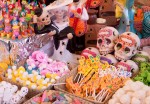With the grind of midterm season wearing students down, Halloween can provide a much needed break. However, while mainstream American culture gears up with jack-o’-lanterns, costumes and enough candy to keep the local dentist in business, different cultures within America are preparing to celebrate other autumn holidays.
Dia de los Muertos
Dia de los Muertos, or Day of the Dead, is a holiday most associated with Mexican culture, though it is celebrated in other parts of Latin America as well. It originates from the Catholic holiday All Saints Day, which was brought to the Americas by the Spanish when they conquered Native American peoples, converting them to Catholicism by choice or by force. The new Spanish-Native American population then integrated the holiday into the local customs and traditions.
Though it is often known as the Mexican counterpart of Halloween, Dia de los Muertos is less about costumes and candy, and more about celebration of deceased loved ones. Unlike Halloween, which treats the dead with some amount of fear and caution, Dia de los Muertos instead celebrates death, echoing the historically commonly accepted attitude in Latin America that it is just a part of life.
According to tradition, the souls of deceased loved ones return on these days. To celebrate their return, people set up altars in their home or on their graves. These altars are filled with marigolds, which are supposed to guide the spirits to the altar, and other ofrenda, which are offerings of food that the deceased loved ones enjoyed eating.
Calaveras, or skulls, dominate the aesthetic of Dia de los Muertos celebrations, from the iconic skull makeup to sugar skulls adorned with vivid designs, either used to be eaten or used as decor. This association with skulls dates back to the famous print of “La calavera catrina,” or the elegant skull, created by Mexican artist Jose Guadalupe Posada.
Given that approximately 20 percent of UCLA students are identified as being of Hispanic origin, it is fitting that Dia de los Muertos is celebrated with gusto at UCLA. This year the On Campus Housing Council event will be on Oct. 30 in the Grand Horizon Room in Covel Commons from 6 to 9 p.m.
Other clubs and organizations at UCLA are also hosting individual events to celebrate Dia de los Muertos. Grupo Folklorico de UCLA, a Mexican cultural dance group, will be organizing its annual Dios de los Muertos celebration on Nov. 11 in Ackerman Grand Ballroom from 7 to 9 p.m.
Another UCLA-related organization, SPARC, which promotes art activism, will also be celebrating Dia de los Muertos from 4 to 7 p.m at their headquarters at the old Venice police station, by holding a traditional ritual named “Calling of the Spirits,” which will be lead by UCLA instructor Martha Ramirez-Oropeza. UCLA students from the UCLA Cesar E. Chavez Chicano/a Studies Department will also be participating in this event.
Diwali
Diwali, which occurs on Oct. 30 this year, is one of the most important Hindu festivals celebrated in India and communities of the Hindu faith worldwide. Diwali signifies the triumph of good over evil, the beginning of the Hindu New Year and the importance of home and family.
The central theme of Diwali revolves around diyas, which are traditional Indian candles made of clay. These diyas are considered auspicious and are used for decorating houses and during the Diwali Puja, or prayer.
According to lore, the people of the city of Ayodhya lit diyas to celebrate the return of Lord Ram, a major Indian deity, from his fourteen year long exile and his victory over the demon king Ravana. The day of his return is now celebrated as Diwali.
Traditions and rituals of Diwali vary from region to region, but all of them include cleaning and decorating houses, visiting and sharing gifts and sweets with neighbors and friends and family, as well as bursting fireworks.
Diwali is also associated with prosperity and luck. A popular custom is to leave the doors of houses open on the night of Diwali. Hindus believe that Goddess Laxmi, the goddess of wealth and luck, will visit their house on this day.
As a festival rich in tradition and fun to partake in, Diwali is celebrated by people all over the world, including here at UCLA. Indus, an umbrella South Asian student organization will be hosting its annual Diwali Banquet on Nov. 6 from 6 to 9 p.m in the Ackerman Grand Ballroom.
UCLA’s diverse student population means that we are exposed to much more than typical American Halloween fare in late October and early November. Why not spend this fall trying something different, and exposing yourself to other holidays and traditions?
